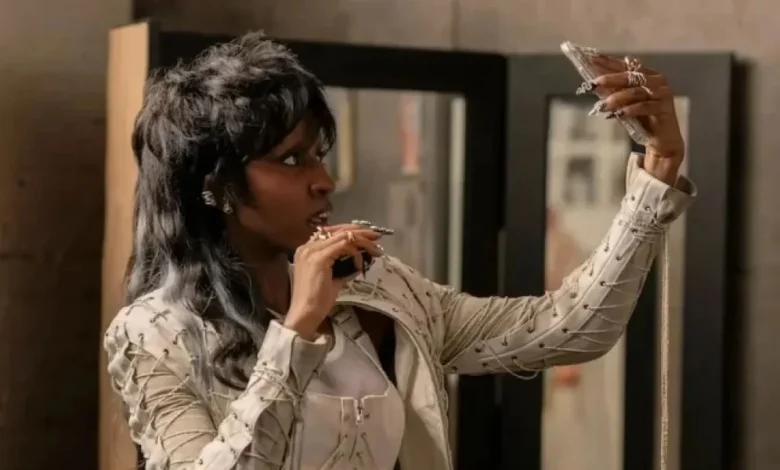Ayo Edebiri’s Quirky British Pop Star Cameo in HBO’s ‘I Love LA’ Sets Social Media Abuzz

Quick Read
- Ayo Edebiri appears as Mimi Rush, a delusional British pop star, in HBO’s ‘I Love LA’ second episode.
- The character’s quirks—British accent, mullet, bedazzled vape—were developed collaboratively with showrunners Rachel Sennott and Emma Barrie.
- Mimi Rush’s storyline satirizes celebrity culture, involving a failed attempt to cast Zendaya as her mother in a music video.
- Edebiri’s improvisational style and friendship with Sennott shaped the unique, comedic character.
- The role has been praised for its humor and unpredictability, making it a highlight of the season.
Ayo Edebiri’s Unconventional Entry: The Making of Mimi Rush
When HBO’s comedy series ‘I Love LA’ launched its second episode, viewers were greeted with a scene that immediately stood out: Ayo Edebiri, Golden Globe winner and rising comedy star, appearing as the eccentric, delusional British pop singer Mimi Rush. This cameo wasn’t just a throwaway gag—it was a moment that rippled through fan circles and sparked conversations across entertainment media. SoapCentral, SSBCrack News, and other outlets quickly picked up the story, digging into how this character came to life and why she resonated so much with audiences.
Friendship and Collaboration: How Ayo Edebiri Landed the Role
Behind the scenes, the story of Edebiri’s casting is a testament to the power of personal connections and creative trust. Showrunner Rachel Sennott, herself a comedic force and longtime friend of Edebiri, saw an opportunity not just to bring in a talented performer, but to reconnect amid packed schedules. “I always want my friends in stuff so I can hang out with them,” Sennott told Deadline, highlighting the blend of personal and professional motivation. The idea for the character took shape over a late-night video call, the day after the Met Gala, with Edebiri dialing in from a dark hotel room, ready to brainstorm.
Sennott pitched the concept of a pop star whose grasp on reality was as shaky as her accent. Edebiri, ever the improviser, immediately began riffing: “Can I have a mullet and a bedazzled vape and a British accent?” The response was a resounding yes. Emma Barrie, Sennott’s co-showrunner, described the resulting character as “so absurd,” a perfect fit for Edebiri’s comedic sensibilities and willingness to push boundaries.
Mimi Rush: Satire, Improvisation, and Hollywood’s Quirks
So who is Mimi Rush? In the world of ‘I Love LA,’ she’s Charlie’s (Jordan Firstman) high-maintenance client—an ambitious, self-absorbed pop star desperate to cast Zendaya as her mother in an upcoming music video. Mimi’s storyline is a send-up of celebrity culture: when Zendaya seems uninterested, Mimi’s team frantically invents excuses, and Charlie tries to soothe her with rumors about Zendaya’s supposed unreliability. The script takes a sharp turn when Zendaya ultimately agrees, undercutting Charlie’s efforts and resulting in his firing.
This subplot, critics say, is more than just comic relief. It’s a sly commentary on the surreal, sometimes ruthless world of Hollywood, where relationships are transactional and reality is constantly bent to serve ambition. Edebiri’s portrayal—complete with a deliberately exaggerated British accent and outlandish costume choices—amplifies the absurdity, allowing viewers to laugh at the industry’s quirks while also reflecting on its deeper truths. According to SSBCrack News, the scenes between Edebiri and Firstman were some of the episode’s most memorable, with Firstman admitting that Edebiri’s intensity left him stuttering on set.
Behind the Scenes: Chemistry, Creativity, and Improvisation
The creation of Mimi Rush was a collaborative process from start to finish. Sennott and Barrie gave Edebiri broad creative freedom, encouraging her to mold the character in her own image. This led to a role that was not just funny, but genuinely distinctive—Edebiri brought a mix of flamboyance and insecurity, improv-driven quirks, and an energy that electrified every scene.
Jordan Firstman, whose character is thrown into chaos by Mimi’s demands, reflected on the chemistry that developed on set. “Ayo was so scary as Mimi Rush, that I [was] stuttering more than I normally would,” he said. That unpredictability made the scenes feel alive, capturing the spontaneous nature of real-life interactions in a way that scripted comedy often misses.
The development process, as Sennott revealed to Bustle, was rooted in friendship but driven by a shared commitment to innovation. “She brings so much to the table,” Sennott said, praising Edebiri’s ability to elevate even the wildest ideas. The team’s willingness to embrace improvisation resulted in a character who not only fits the show’s offbeat tone but stands out as a highlight of the season.
Reception: Fans, Critics, and the Future of ‘I Love LA’
Since airing, Edebiri’s guest spot has received widespread praise. Fans on social media have dissected her every line, celebrating her comedic timing and the sheer unpredictability of Mimi Rush. Entertainment outlets have noted the role as a fresh twist for Edebiri, who’s known for her sharp wit but rarely gets to play such an overtly absurd character.
The show itself, airing Sunday nights on HBO and streaming on HBO Max, has continued to draw in viewers with its blend of satire and celebrity culture. Leighton Meester’s appearance as Sennott’s character’s boss has also been highlighted, further cementing ‘I Love LA’ as a magnet for talent and quirky storytelling.
The creative freedom given to Edebiri and the collaborative spirit behind her character signal a shift in how guest appearances can be used to enrich a show’s narrative, rather than simply add star power. As more episodes roll out, audiences are eager to see whether Mimi Rush returns—and what new chaos she might bring.
Ayo Edebiri’s cameo as Mimi Rush is more than a comedic detour—it’s a showcase for the possibilities of collaborative storytelling, where friendship and creative freedom intersect to produce a character that is both hilarious and incisive. The role’s success suggests that when showrunners trust their cast to improvise and personalize, the result can transcend expectations, redefining what a guest spot can mean in contemporary television.





